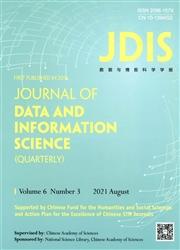Mapping the geography of editors-in-chief
IF 1.5
3区 管理学
Q2 INFORMATION SCIENCE & LIBRARY SCIENCE
引用次数: 0
Abstract
Purpose This study aims to explore the geography of editors-in-chief to demonstrate which countries exercise the highest-level decision-making in scholarly communication. In addition, the study seeks to investigate the potential relationships between the origin and nationality of academic publishers and the geography of editors-in-chief. Design/methodology/approach The analysis involves 11,915 journals listed in Web of Science’s Social Sciences Citation Index (SSCI) and Science Citation Index Expanded (SCIE). These journals employ 15,795 scholars as editors-in-chief. The geographical locations of the institutions the editors-in-chief are affiliated with were identified; then, the data were aggregated at the country level. Findings The results show that most editors-in-chief are located in countries of the Anglosphere, primarily the United States and the United Kingdom. In addition, most academic publishers and professional organizations that publish academic journals were found to be based in the United States and the United Kingdom, where most editors-in-chief are also based. Research limitations The analysis involves journals indexed in the Web of Science’s SCIE/SSCI databases, which are demonstrably biased toward the English language. Furthermore, the study only takes a snapshot of the geography of editors-in-chief for the year 2022, but it does not investigate trends. Research implications The study maps the highest-level decision-making in scholarly communication. Originality/value The study explores and maps the geography of editors-in-chief by using a massive dataset.绘制主编地理图
目的 本研究旨在探索主编的地域分布,以说明哪些国家在学术交流中行使最高决策权。此外,本研究还试图探讨学术出版商的来源和国籍与主编地域之间的潜在关系。设计/方法/途径 分析涉及《科学引文索引》(Web of Science's Social Sciences Citation Index, SSCI)和《科学引文索引》(Science Citation Index Expanded, SCIE)中收录的 11,915 种期刊。这些期刊聘请了 15,795 位学者担任主编。确定了主编所属机构的地理位置,然后将数据汇总到国家层面。结果 结果显示,大多数主编位于盎格鲁圈国家,主要是美国和英国。此外,大多数学术出版商和出版学术期刊的专业组织都设在美国和英国,而大多数主编也在美国和英国。研究局限性 本分析涉及科学网 SCIE/SSCI 数据库收录的期刊,而这些数据库明显偏重英语。此外,本研究只对 2022 年主编的地理位置进行了概括,但没有调查趋势。研究意义 该研究绘制了学术交流领域最高决策层的地图。原创性/价值 该研究通过使用大量数据集来探索和绘制主编的地理分布。
本文章由计算机程序翻译,如有差异,请以英文原文为准。
求助全文
约1分钟内获得全文
求助全文
来源期刊

Journal of Data and Information Science
INFORMATION SCIENCE & LIBRARY SCIENCE-
CiteScore
3.50
自引率
6.70%
发文量
495
期刊介绍:
JDIS devotes itself to the study and application of the theories, methods, techniques, services, infrastructural facilities using big data to support knowledge discovery for decision & policy making. The basic emphasis is big data-based, analytics centered, knowledge discovery driven, and decision making supporting. The special effort is on the knowledge discovery to detect and predict structures, trends, behaviors, relations, evolutions and disruptions in research, innovation, business, politics, security, media and communications, and social development, where the big data may include metadata or full content data, text or non-textural data, structured or non-structural data, domain specific or cross-domain data, and dynamic or interactive data.
The main areas of interest are:
(1) New theories, methods, and techniques of big data based data mining, knowledge discovery, and informatics, including but not limited to scientometrics, communication analysis, social network analysis, tech & industry analysis, competitive intelligence, knowledge mapping, evidence based policy analysis, and predictive analysis.
(2) New methods, architectures, and facilities to develop or improve knowledge infrastructure capable to support knowledge organization and sophisticated analytics, including but not limited to ontology construction, knowledge organization, semantic linked data, knowledge integration and fusion, semantic retrieval, domain specific knowledge infrastructure, and semantic sciences.
(3) New mechanisms, methods, and tools to embed knowledge analytics and knowledge discovery into actual operation, service, or managerial processes, including but not limited to knowledge assisted scientific discovery, data mining driven intelligent workflows in learning, communications, and management.
Specific topic areas may include:
Knowledge organization
Knowledge discovery and data mining
Knowledge integration and fusion
Semantic Web metrics
Scientometrics
Analytic and diagnostic informetrics
Competitive intelligence
Predictive analysis
Social network analysis and metrics
Semantic and interactively analytic retrieval
Evidence-based policy analysis
Intelligent knowledge production
Knowledge-driven workflow management and decision-making
Knowledge-driven collaboration and its management
Domain knowledge infrastructure with knowledge fusion and analytics
Development of data and information services
 求助内容:
求助内容: 应助结果提醒方式:
应助结果提醒方式:


